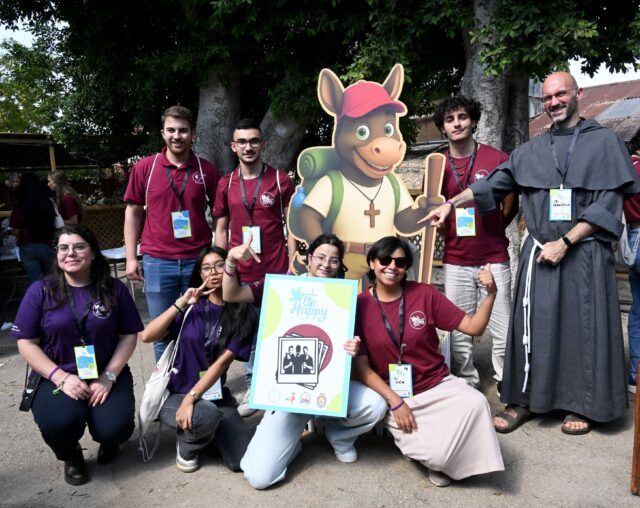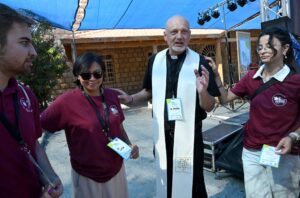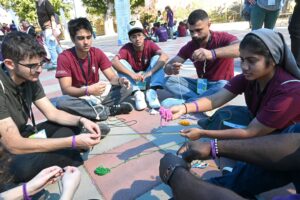
DEIR RAFAT, Israel — At first, Grace Rofa, 20, a Catholic Palestinian from Jerusalem, and Reign Arpon, 19, a Filipino member of the Hebrew-speaking Catholic community in Tel Aviv, were unsure what the Oct. 18 “Be Happy Youth Festival” would be like.
After two years of the Israel-Hamas war in the Gaza Strip, emotions were still raw despite the ceasefire, with each having lived a very different experience. But as the morning progressed at Deir Rafat monastery, which hosted the retreat outside of Jerusalem, their initial reservations quickly faded. They realized that, as Christians, they had more in common than not.
The retreat, organized by the St. James vicariate for Hebrew-speaking Catholics and the Latin patriarchate’s general secretariat for the youth in Galilee in collaboration with the Youth Pastoral Office of the Latin Patriarchate, brought together about 200 young people from the Arabic and Hebrew-speaking Catholic communities.
It was meant to help the youth “stand together in hope” despite their cultural differences, especially after the war that followed the Oct. 7, 2023 Hamas attack on southern Israeli communities, said Father Piotr Zelazko, patriarchal vicar for the St. James vicariate. The gathering included young adults and leaders from nine different parishes in Israel.
“It’s not as hard as I thought because we’re human,” Rofa said. “We can have different ideologies but we’re united by the church and by Christ. We’re Christian. That’s how we’re united. That’s why we’re here.”
Arpon, too, found the atmosphere unexpectedly welcoming. “I thought it would be awkward … since the war, maybe people would not see each other as friends, as sisters and brothers, but they are very friendly and I’m so happy that it’s this way,” she said.
Ram Perez, 18, a convert to Catholicism and member of the Hebrew-speaking Catholic community, said he usually does not have the opportunity to meet Christian Arabs. He noted that St. Paul in his letters emphasizes the importance of community.
“We are all one body, the body of Christ. To not know the other members of your body is like for the eye to not know the ear. So we have to communicate, we have to talk, we have to meet, we have to pray together, to love each other,” he said.
Father Zelazko said that, despite their cultural differences, the event was vital for both Arabic and Hebrew-speaking Catholic youth to unite in hope.

“The goal is to see all who are here as persons in the spirit of God,” Father Zelazko said. “Their worlds are so separated that the fact that we are all Catholics sends a message, not so much for the world, but for us in this difficult time that (we have more in common). We have the same fears and problems and like the same music. This is a moment of hope.”
The retreat began with priestly blessings before participants broke into smaller groups. They moved through different stations — friendship bracelet making, creating symbols of hope on stones, and reflecting on a letter from a fictional pilgrim embarking on a journey in the midst of war. Conversations flowed in Hebrew, Arabic and English, creating a sense of unity.
Father Benedetto di Bitonto, parish priest of the Jerusalem Hebrew-speaking Catholic community, explained that the conflict in the region affects Catholics on both sides. While they share faith and a bishop, cultural and societal differences create emotional “walls.”
Hebrew-speaking Catholic youth, who live within the Israeli reality and serve in the Israeli army, may not naturally connect with Christian Arabs, whose experiences differ greatly.
“We have to … let fall many walls that we have in our minds and in our hearts,” he said. “The Gospel challenges us not to put anybody in boxes and just to see human beings as our brothers.”
The goal, he said, is for such gatherings to become routine. Despite the challenges of the past two years, he saw the willingness to come together as a “miracle.” After all, the instinct after such traumatic events is often to retreat into one’s own community for healing.
“Probably one of the most difficult things that this war has provoked in our hearts is the fact that we are in so much pain that we are not able to see the pain in the other,” he said.
Sister Muna Totah, a teacher and member of the Sisters of St. Joseph of the Apparition, also saw the gathering as a hopeful sign. As a native of Ramallah working in Israel, she had made the conscious decision to connect with Hebrew-speaking Catholics, understanding that everyone, regardless of background, shared similar fears and emotions.

“We’re all in the same boat,” she said. “We can confront our emotions openly, letting Jesus heal us by approaching the other, not by pushing them away.”
In the afternoon, Latin Patriarch Cardinal Pierbattista Pizzaballa presided over Mass, highlighting in his homily that the gathering was a reflection of unity as the central vocation of the church in the Holy Land, especially in difficult times marked by division and suffering.
“Maybe we have many differences among us,” he said, “but I don’t know what unites us other than Jesus Christ. Because of Him, we can overcome our differences and diversities and find common ground — not only in our humanity but in our faith, which gives fullness to our humanity.”








